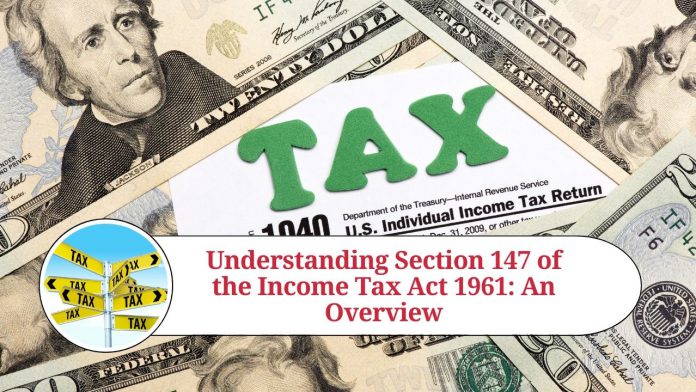Section 147 of the Income Tax Act 1961 is an important provision that empowers the income tax department to reopen the assessment of a taxpayer if they suspect that income has escaped assessment. This provision is commonly referred to as the “reopening of assessment” or “reassessment” provision.
In this blog post, we will take a closer look at the provisions of Section 147 of the Income Tax Act 1961, understand the conditions under which the assessment can be reopened, and the consequences of reopening an assessment.
Conditions for Reopening of Assessment:
The income tax department can reopen the assessment of a taxpayer under Section 147 if the following conditions are met:
- The Assessing Officer has reason to believe that income has escaped assessment: The Assessing Officer should have a reasonable belief that some income chargeable to tax has escaped assessment in the original assessment year.
- The income has escaped assessment due to the failure of the taxpayer to disclose fully and truly all material facts necessary for the assessment: The Assessing Officer should have reason to believe that the income has escaped assessment due to the failure of the taxpayer to disclose all the relevant material facts.
- The income has escaped assessment for any other reason: The Assessing Officer can reopen the assessment if they have any other reason to believe that income has escaped assessment.
Consequences of Reopening of Assessment:
If the assessment is reopened under Section 147, the taxpayer will be required to furnish a fresh return of income for the relevant assessment year. The Assessing Officer can then assess or reassess the income of the taxpayer, taking into account the income that has escaped assessment.
The Assessing Officer can also assess or reassess any other income that has come to their notice during the course of the proceedings, even if it is not related to the income that has escaped assessment.
However, the reassessment must be completed within a specific time frame. The time limit for completing the reassessment is four years from the end of the relevant assessment year. If the income that has escaped assessment is more than INR 1 lakh, the time limit is six years. In case of assets located outside India, the time limit is sixteen years.
Conclusion:
Section 147 of the Income Tax Act 1961 is a powerful provision that allows the income tax department to reopen the assessment of a taxpayer if they suspect that income has escaped assessment. However, the provisions of this section must be exercised with caution, as they can have serious consequences for the taxpayer.
If you are a taxpayer and receive a notice for reopening of assessment, it is advisable to consult a tax expert or a Chartered Accountant to understand the implications and take appropriate action.
Read more useful content:
- section 234e of income tax act
- section 286 of income tax act
- section 90a of income tax act
- section 40a(7) of income tax act
- section 226(3) of income tax act
- section 24 of income tax act
Frequently Asked Questions (FAQs)
Q1. What is Section 147 of the Income Tax Act 1961?
A1. Section 147 is a provision that allows the income tax department to reopen the assessment of a taxpayer if they have reason to believe that income chargeable to tax has escaped assessment.
Q2. Under what circumstances can the assessment be reopened under Section 147?
A2. The assessment can be reopened if the Assessing Officer has reason to believe that income chargeable to tax has escaped assessment due to the failure of the taxpayer to disclose fully and truly all material facts necessary for the assessment or for any other reason.
Q3. What is the time limit for reopening the assessment under Section 147?
A3. The time limit for reopening the assessment is four years from the end of the relevant assessment year. However, if the income that has escaped assessment is more than INR 1 lakh, the time limit is six years. In case of assets located outside India, the time limit is sixteen years.
Q4. What is the procedure for reopening the assessment under Section 147?
A4. The Assessing Officer must issue a notice to the taxpayer, informing them of the intention to reopen the assessment. The taxpayer must then furnish a fresh return of income for the relevant assessment year. The Assessing Officer can then assess or reassess the income of the taxpayer, taking into account the income that has escaped assessment.




















